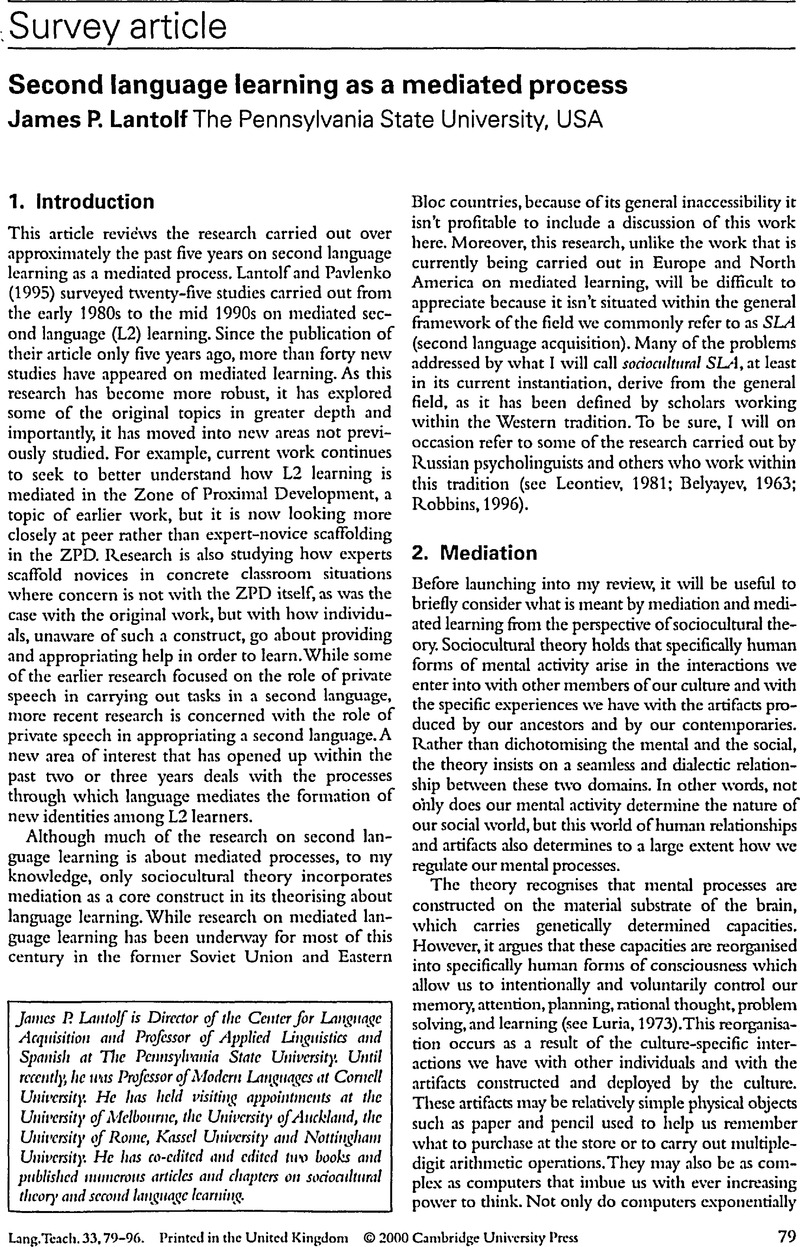Crossref Citations
This article has been cited by the following publications. This list is generated based on data provided by Crossref.
Soler, Eva Alcón
2002.
Relationship between teacher-led versus learners’ interaction and the development of pragmatics in the EFL classroom.
International Journal of Educational Research,
Vol. 37,
Issue. 3-4,
p.
359.
Kramsch, Claire
2003.
Second language acquisition, applied linguistics and the teaching of foreign languages.
The Language Learning Journal,
Vol. 27,
Issue. 1,
p.
66.
Tocalli-Beller, Agustina
2003.
Cognitive Conflict, Disagreement and Repetition in Collaborative Groups: Affective and Social Dimensions from an Insider's Perspective.
The Canadian Modern Language Review,
Vol. 60,
Issue. 2,
p.
143.
DiCamilla, Frederick J.
and
Antón, Marta
2004.
Private speech: a study of language for thought in the collaborative interaction of language learners.
International Journal of Applied Linguistics,
Vol. 14,
Issue. 1,
p.
36.
Lapkin, Sharon
and
Swain, Merrill
2004.
What Underlies Immersion Students' Production: The Case Of Avoir Besoin De.
Foreign Language Annals,
Vol. 37,
Issue. 3,
p.
349.
Tocalli-Beller, Agustina
and
Swain, Merrill
2005.
Reformulation: the cognitive conflict and L2 learning it generates.
International Journal of Applied Linguistics,
Vol. 15,
Issue. 1,
p.
5.
Cook, Guy
2005.
Calm seas or troubled waters? Transitions, definitions and disagreements in applied linguistics.
International Journal of Applied Linguistics,
Vol. 15,
Issue. 3,
p.
282.
Ellis, Rod
2005.
Principles of instructed language learning.
System,
Vol. 33,
Issue. 2,
p.
209.
Kinginger, Celeste
and
Belz, Julie A.
2005.
Socio-cultural perspectives on pragmatic development in foreign language learning: Microgenetic case studies from telecollaboration and residence abroad.
Intercultural Pragmatics,
Vol. 2,
Issue. 4,
Smith, Heather
2006.
Playing to Learn: A Qualitative Analysis of Bilingual Pupil-Pupil Talk During Board Game Play.
Language and Education,
Vol. 20,
Issue. 5,
p.
415.
Lund, Andreas
2006.
WIKI i klasserommet: individuelle og kollektive praksiser.
Norsk pedagogisk tidsskrift,
Vol. 90,
Issue. 4,
p.
274.
Leki, Ilona
2006.
Negotiating socioacademic relations: English learners' reception by and reaction to college faculty.
Journal of English for Academic Purposes,
Vol. 5,
Issue. 2,
p.
136.
Lantolf, James P.
2006.
SOCIOCULTURAL THEORY AND L2: State of the Art.
Studies in Second Language Acquisition,
Vol. 28,
Issue. 01,
MCDONOUGH, KIM
and
CHAIKITMONGKOL, WANPEN
2007.
Teachers' and Learners' Reactions to a Task‐Based EFL Course in Thailand.
TESOL Quarterly,
Vol. 41,
Issue. 1,
p.
107.
Huong, Le Pham Hoai
2007.
The More Knowledgeable Peer, Target Language Use, and Group Participation.
The Canadian Modern Language Review,
Vol. 64,
Issue. 2,
p.
329.
Rocha, Cláudia Hilsdorf
2007.
O ensino de línguas para crianças no contexto educacional brasileiro: breves reflexões e possíveis provisões.
DELTA: Documentação de Estudos em Lingüística Teórica e Aplicada,
Vol. 23,
Issue. 2,
p.
273.
SMITH, HEATHER J.
2007.
The Social and Private Worlds of Speech: Speech for Inter‐ and Intramental Activity.
The Modern Language Journal,
Vol. 91,
Issue. 3,
p.
341.
WARING, HANSUN ZHANG
2008.
Using Explicit Positive Assessment in the Language Classroom: IRF, Feedback, and Learning Opportunities.
The Modern Language Journal,
Vol. 92,
Issue. 4,
p.
577.
Lei, Xiao
2008.
Exploring a sociocultural approach to writing strategy research: Mediated actions in writing activities.
Journal of Second Language Writing,
Vol. 17,
Issue. 4,
p.
217.
Soler, Eva Alcón
2008.
Investigating pragmatic language learning in foreign language classrooms.
IRAL - International Review of Applied Linguistics in Language Teaching,
Vol. 46,
Issue. 3,



